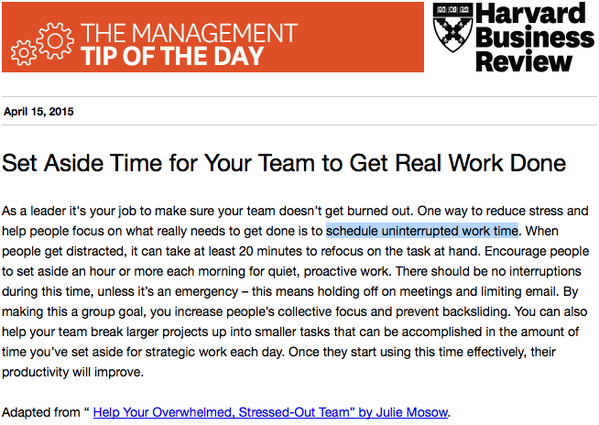There are about 24.2 million hits on Google for “uninterrupted work time,” so it feels like something people are interested in and others are putting out content around. Makes sense, right? We’re all super busy, e-mail is the current generation’s ultimate time waster, and ‘Death By Meeting’ is a real tangible thing.
I had a friend once (worked for Accenture, I believe, in one of those “Project Manager” roles where you don’t really know exactly what he does all day) and he told me at a bar, “Honestly, most days I can’t even do real work until 4pm.” I feel like a lot of people probably feel similarly, and especially those in the middle tier — half of the reason for the existence of the middle-tier is to go to meetings and throw out ideas that the upper tier “listens” to and then goes in a totally different direction completely not based on anyone’s guidance. That’s where the 13 percent employee engagement stats come from, in a nutshell.
So … how about uninterrupted work time? Could we do it?
We could, yes, but it requires a few shifts in philosophy. Let me start with the most basic point of all:
- Anyone can do this whenever they want: Just block three hours to yourself on a Thursday or something. No one will try to schedule over that. The “Meeting Planner” and calendar time are sacrosanct in the American workplace. So if you need time to grind on a project, schedule that shit in Outlook or Slack or Google or whatever you use and then just take it. No one will mess with you if there’s a block on your calendar, typically (and if they do, it’s likely up the chain; up the chain meetings you pretty much have to take anyway. That’s called hierarchy.)
Alright, so … how could we do it aside from just doing it ourselves?
- If you’re a manager, think about the point of meetings: Like, think for one second about calling it. Here’s kind of how the whole system works, IMHO: the goal of most companies is to “make money.” However, the company can’t say that, because it sounds bad and unethical. So they mask their goal and their internal priorities as “communication” and “collaboration” and other buzzwords. This is all bullshit. They want to make money, make more money, and discuss other plans to make money. This filters down incorrectly to the middle level, and they think “communication” and “collaboration” are good things, and maybe things that can help them get promoted. (They’re not; you get promoted off relationships and ability to make money for other people, honestly.) It gets tricky here, though: people don’t actually want to collaborate. People want to do their shit, get their rewards, gossip and shoot the shit with co-workers, and go home. (For the most part.) Have you ever been in a “team meeting” where people go around and say “what they’re working on?” Aside from premature ejaculation, there isn’t much more awkward than that in the world. “Well, you know, just grinding ahead on my Q3 projects…” Nobody ever knows WTF to say in these things. It’s all a big roundabout. And yet managers call these things and other check-ins all the time. Stop doing it. Give people back their time. Rather than talking about work, actually do work. Make progress on meaningful things. That’s where ‘purpose’ and ‘engagement’ lie.
- Also think about the point of e-mail: You know what happens when you send an e-mail instead of having a 5-minute conversation with someone? The e-mail thread becomes a total train wreck, 61 people get added, there’s 97 reply-alls, the message has changed 4,287 times, and really, a simple conversation about “Hey, this is what I’m thinking but I value your ideas too” would have been much more successful. People love the “hop on a call” or “fire off an e-mail” model, when in fact face-to-face communication would oftentimes be a lot more relevant.
- Schedule this time for your people: Rather than send out a meeting invite, how about you send out a three-hour block for people to do individual work? You know how much your direct reports would love you for this? Respect is pretty much a dead notion in the workplace these days, as is “motivation.” You know why? Tons of reasons, but a major one is that managers focus so much on deliverables and stop doing nice little things like this. Remember: deliverables will always be there. They’re not going anywhere. You can chase deliverables for the entirety of your career. You know what will happen? You’ll always be frustrated and behind. If you want to chase something within the confines of your office, chase relationships and opportunities. Those matter. Deliverables are just “replace A-goal with B-vision and follow the check steps.”
Oh, and hey:
"Four hours of uninterrupted time is the best gift you can give anybody at work." http://t.co/0GroNsB2td
— TED Talks (@TEDTalks) May 5, 2014
No shit, baby. Now let’s actually move towards a culture where people both understand and act on that idea.
